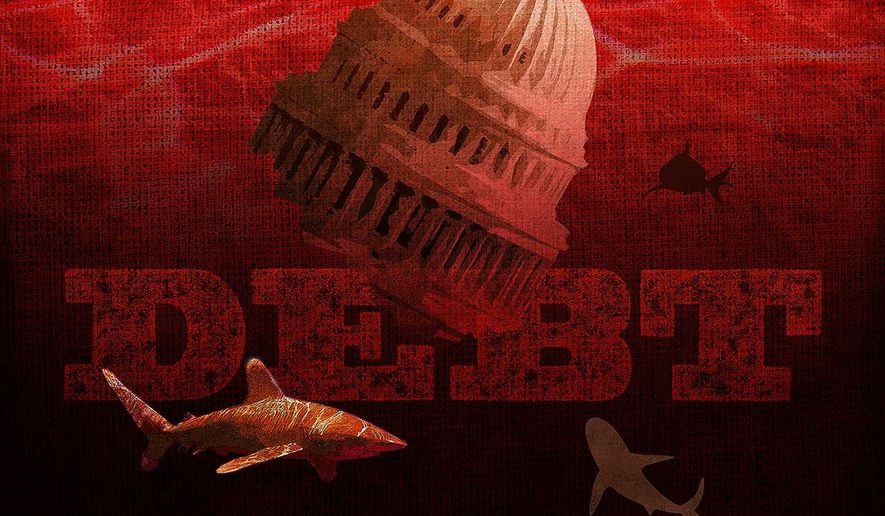OPINION:
The Congressional Budget Office released its latest national fiscal outlook last week, and it should serve as an iPhone-style emergency alert for lawmakers. The key takeaway: The United States is on the verge of a debt spiral unless it immediately gets its fiscal house in order.
The CBO reveals that interest on the $34 trillion national debt is now so great that it’s the primary driver of annual deficits going forward. Interest payments will exceed the entire defense budget this year and reach $1 trillion next year.
To the extent that they admit the nation has a fiscal problem, Democrats and the mainstream media blame tax cuts, especially the Tax Cuts and Jobs Act passed in 2017 under then-President Donald Trump.
“It’s the revenue shortfall, stupid,” a group that advocates high taxes said last year. A widely cited Center for American Progress report asserts that this law cost the nation approximately $1.7 trillion in revenue through 2023.
Expect this scapegoating to increase in the months and years ahead as the fiscal crisis becomes impossible to ignore and the individual and small-business provisions of the law come up for renewal.
This tax shortfall argument, however, has no basis in reality. The CBO numbers clearly show that government spending, not tax revenue, is responsible for the unsustainable debt and deficit.
In 2017, the year before the Tax Cuts and Jobs Act took effect, the federal government brought in $3.3 trillion in tax revenue. Six years later, in 2023, it took in $4.4 trillion — a 33% increase. Even accounting for historic inflation, real tax revenue is still significantly higher than it was in 2017.
The CBO projects tax revenue will grow by 45% to $6.4 trillion by the end of the decade. In other words, as President John F. Kennedy said decades ago, tax cuts increase tax revenue.
Measured as a share of the economy, tax revenue averaged 17% of gross domestic product in the years since the TCJA was passed, the same share as in 2017, and would have been higher if not for the pandemic and associated economic shutdowns. The CBO projects the tax share to grow in the years ahead.
So much for progressives’ claim that tax cuts caused the fiscal crisis. The figures show they didn’t even contribute to it.
The fiscal crisis is solely due to reckless government spending. Government expenditures grew from $4 trillion in 2017 to $6.1 trillion in 2023, an increase of more than 50%. In classic Washington fashion, the $6 trillion-plus COVID-19 spending blowout years essentially became the new budget baseline. The government spending ratchet moves in only one direction.
As a result, the deficit increased from a high if manageable $700 billion in 2017 to an outrageous $1.7 trillion in 2023. The nation is on track for a $2 trillion deficit this year, and the CBO projects annual deficits to grow even higher in the years to come.
Identifying spending as the sole culprit of the fiscal mess is crucial as Congress looks to extend the Tax Cuts and Jobs Act. The House of Representatives recently passed legislation extending expensing provisions of the act through 2025, the year that the rest of the law’s individual and small-business tax cuts are to expire.
On paper, these expensing extensions are paid for by ending the COVID-era employee retention tax credit. But as this data shows, tax cuts pay for themselves. Based on this reality, lawmakers should quickly move to extend the Tax Cuts and Jobs Act in a clean bill without any fear of worsening the deficit.
To get the nation’s fiscal house in order and prevent the coming debt crisis, Congress must immediately cut spending. Returning spending to pre-pandemic levels can eliminate the deficit and begin to address the debt.
The fiscal fight will be one of the defining political issues of the generation. As lawmakers prepare for battle, they should arm themselves with the knowledge that tax cuts didn’t cause the problem and tax increases aren’t needed to solve it.
• Alfredo Ortiz is president and CEO of the Job Creators Network, author of “The Real Race Revolutionaries,” and co-host of the “Main Street Matters” podcast.




Please read our comment policy before commenting.